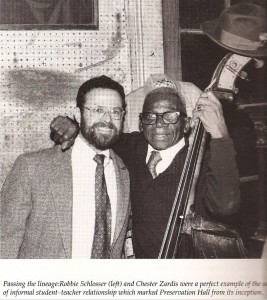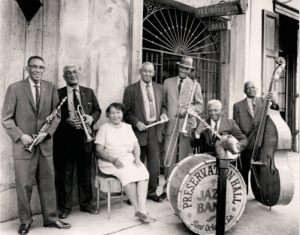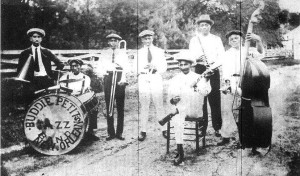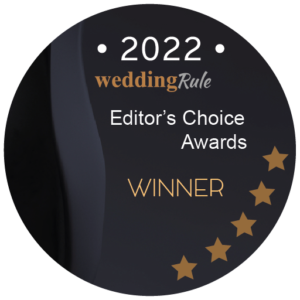=========================================================
Learning Traditional Jazz is best done by combining two familiar methods. The same ones you probably use in your own projects every day.
The first method is informal — by working “on-the-job” with more experienced musicians. The second is formal — by attending school and taking lessons to develop musical technique.
In your own life, you can adapt these two methods to any project you tackle. This same balance of “real-world” experience and technical study helps everywhere:
- Learning practically anything.
- Solving a problem.
- Managing your next project.
- Raising your children.
- You name it. Even planning your wedding music.
The challenge is to strike the proper informal vs formal balance. Each approach brings important advantages.
For the informal side, you can listen to the voice of experience — professional wedding planners, or wedding musicians, or even married friends — who have first-hand experience at planning wedding music. At least once.
Searching just a little, you can easily find more formal, structured guides in workshops, webinars, seminars, wedding magazines, wedding websites, chapters in wedding books, and even sessions in training programs to become a certified wedding coordinator.
Now, what about learning traditional jazz? Here’s what I know about how people learn to be musicians.
Many musicians learn their art with mentors, through relationships with experts. Here they learn not only technical skills but also the “big picture” of musicianship and how to get around in the world of music.
Most of my formal musical training came in my elementary and high school years. There’s always been much I don’t know about music, and I’ve been “filling in the blanks” most of my life. But I’m getting there.
How did I learn about traditional jazz, New Orleans music, and the Popular Standards? Not from any formal relationship with a mentor, but instead mainly from working at weddings and parties, talking and playing with many friends here in California and in New Orleans. I’ve always been fortunate to work with friends who were much better musicians than I was.
For about a dozen years back in the 1970s and 80s, my wife and I visited New Orleans several times a year. We spent much of that time with many of the old veteran jazzmen. In all, I’ve had LOTS of informal mentors. They taught me a lot about traditional jazz, New Orleans music, working in a band, and entertaining people. And in most cases, this was how THEY learned years ago, when they were my age.
 Here is a photo of me with Chester Zardis, one of my favorite New Orleans bassists. (Photo from the late 1970s, in William Carter’s 1991 book, Preservation Hall.)
Here is a photo of me with Chester Zardis, one of my favorite New Orleans bassists. (Photo from the late 1970s, in William Carter’s 1991 book, Preservation Hall.)
There were countless hours talking with Chester and with dozens of those old timers, occasionally sitting in with them at Preservation Hall and parading with New Orleans brass bands, and watching and listening to them in action for all those years. Chester was my main inspiration during those early years, and I still think of his powerful, buoyant, driving rhythm every time I play.
 Here is a photo of Chester in the mid 1960s, with one of the early versions of the Preservation Hall Jazz Band. This was about 10 years before I met him. George Lewis, the clarinetist, used to call Chester his very favorite bassist.
Here is a photo of Chester in the mid 1960s, with one of the early versions of the Preservation Hall Jazz Band. This was about 10 years before I met him. George Lewis, the clarinetist, used to call Chester his very favorite bassist.
 Born around the turn of the century, Chester Zardis was one of New Orleans’ premier bassists for over 70 years. Here is an old photo of young Chester (from about 1916 or so) playing in the popular band led by trumpeter Buddie Petit.
Born around the turn of the century, Chester Zardis was one of New Orleans’ premier bassists for over 70 years. Here is an old photo of young Chester (from about 1916 or so) playing in the popular band led by trumpeter Buddie Petit.
Petit was another legendary trumpeter who left no recorded legacy, but all the old-timers say he was one of the best. Just imagine what Chester must have learned while working with him!
Now, let me tell you a little story. Recently, I heard one veteran musician praise another, saying something like, “I knew he was a good player, but for the longest time I regarded him mainly as a competitor. Now, in recent years, I’ve been listening to his remarkable music more closely, and I’m always learning something new. Now I wish I’d started listening to him years earlier.”
See what I mean? Much of what we know we learn either formally from experts willing to teach us, or from being with experts informally, talking with them, watching and listening to them in action.
So if you’re planning wedding music, here’s a tip: Balance formal and informal advice. Seek formal information — spoken, written, or “in the classroom”. And surround yourself with experts you admire and learn from the examples they set.
.
CLICK here to tweet this post, and join our Magnolia Jazz Band fans on Facebook. You’ll receive daily tips for planning wedding and party music, and you’ll get reminders for our public events.
Thanks for reading this article. I appreciate your interest and hope you get a few good ideas here. Got one or two? I'd love to hear what you liked. Please write me a little COMMENT below. Start a conversation -- I'll reply. Promise.
By the way, does a friend need help selecting wedding or party music? Do them a favor: EMAIL this article, or SHARE it on Facebook, LinkedIn, or Google+.
And if you find my blog useful, please LIKE it, TWEET it, and SUBSCRIBE for more ideas. Use those cute little icons below.
Meanwhile, the Magnolia Jazz Band entertains at weddings and parties throughout the San Francisco Bay Area. If you are ever nearby, you’ll love catching us in action, seeing and hearing us create a great mood.
How can I help you? Call 408-245-9120 or use Robbie@MagnoliaJazz.com. Planning a celebration? Ask about our availability.






















We were just talking about jazz last night- isn’t jazz by it’s creation improvisational in it’s core? So learning means finding that creative energy and ability to flow.
Thanks, Ann and Earl,
Glad you enjoyed this post. Good question! Sorry I’m so wordy, but this is one of my hot buttons.
Yes, IMHO jazz is improvisational the same way a conversation is improvisational. It’s original spirit lies in the “give-and-take” among the “voices”, even if there’s only one instrument playing. Some musicians disagree, and to my ear, their music sounds shallow — like only one side of a conversation. I may prefer it too simple, but I think the flash of technical brilliance often hinders jazz music.
So in my mind LEARNING means keeping it simple and focusing on the musical conversation — learning to LISTEN to the others, learning to REPLY to acknowledge and support their voices, and learning to hear our collective music, being mindful of it’s shape and the mood it conveys.
Sorry, I don’t understand what “that creative energy and ability to flow” means. I’m sure it’s important somehow, but it’s a little to touchy-feely for my poor brain.
Robbie
means what you said Robbie to listen, reply and create collective music (and Ann always hollers at when when I write another blog post somewhere- think you just did.)
Thanks, Earl. Right you are! Sounds like there’s another blog post up there — and it’s something I feel strongly about, so I better watch what I say. I’ll re-read, simplify what I said, and post it in a few minutes.
Robbie
Ahhh, where would I be without mentors. I can’t possibly imagine. At an early age I realized the importance of being eager to learn from those more qualified than yourself, as well as from those willing to give. Important message indeed!
Sharon Hiebing
Relocation Without Rose-Colored Glasses
http://www.wealthships.com
Thanks, Sharon,
Glad you enjoyed this post. I agree: Mentors make the world progress, otherwise each of us would always start at square one. So learning how to learn is everybody’s first responsibility. Meanwhile, whenever the weather here is cold and rainy, I think about visiting Belize. Maybe someday.
Robbie
I have had the excellent opportunity to be able to visit New Orleans and experience the flavor of this very exciting city. The music that traveled thru the streets makes NoLa, well, NoLa. I’m fortunate to have a husband who was in the music business and has a deep appreciation for all music and he shares that with me.
Choosing to be in audience with the right teacher for my personal growth needs is always something I take seriously. Thank you for the reminder to surround myself with those that I admire.
Thanks, Debe,
Welcome to Blogger Monday! You’re surrounded with good people here. Glad you enjoyed this post. I agree: New Orleans is an amazing city — pre-Katrina, of course, as well as post-Katrina. Which did you visit? As part of your husband’s music biz, or a vacation, or what?
Robbie
Loved the photos you included here, and the history that goes along with them. I have always thought Jazz is so moving and emotional and dripping with such human and powerful stories and insights; I can see how one musician would be an inspiration to another just from the sharing of experiences and the expression of them through their music. I believe that we truly do reflect the people that we spend the most time with; and I believe we learn from everyone around us — all different types and levels of learning. No two people are ever exactly the same, so if I can keep an open mind, I know I can glean something of value from every interaction I have — I am not always in that zone, however! Lately I seem most attracted to people who have a positive attitude, are comfortable with themselves, and who focus more on others than on themselves. That is also the person I am striving to become!
Thanks, Donna,
Glad you enjoyed this post. I have an informal theory that most human activity — and not just music, or poetry, or painting, and the rest of what we call “arts” — can be expressive. We just need to learn how to “read the language”, so to speak, so we can become able to learn something from everything people express. For a simple example, can an auto mechanic express something like “pride” in his work? What do you think?
Robbie
Love those photos Robbie! Yes, thank goodness for the go-givers willing to teach us and share their knowledge. Learning by example is a great way…and if we didn’t have people who knew more than us wanting to develop and enlighten us where would any of us be today, right?! I’m surprised that being in the music business for many years I never thought about how much you all learn from one another…how silly of me! Thanks for pointing this out for me:) Your posts are always full of information and history….very enjoyable and educational:) Thanks!
Rita Brennan Freay
ritabrennanfreay.com
Thanks, Rita,
Glad you enjoyed this post. With those kids running around, I bet you see “learning by example” every minute! I have a brother and 2 sisters, and back in the dark ages my grandfather used to watch us and shake his head, saying “Monkey see, monkey do”. BTW, you were in the music business for many years?
Robbie
One of the points that stood out to me was how much we can learn if we put down our competitive streak and open ourselves to learning from others. I was once very wary of someone in my profession but began to suspect she had some skills I could learn from. I stopped being competitive (and threatened) and sought out her advice. I was so impressed with how she was able to help me I went on to do more learning from her and she became an informal mentor to me. It’s a lesson I hold dear.
Beautiful old pictures…really love the mood they create.
Judy Stone-Goldman
The Reflective Writer
http://www.thereflectivewriter.com/blog/
“My cat owns me, my clutter stymies me, my writing frees me.
Word maven loves–and learns from–ordinary life.”
Thanks, Judy,
Glad you enjoyed this post. You tell a wonderful story! It should be universal, and I wish everyone could tell their own version. We each pack our own arsenal of skills and talents, and there’s so much we could learn from each other.
Robbie
Great pictures in this post. I totally agree with you on the power of mentors. I don’t know where I would be without someone helping me along the way. Reading more about you makes me wish I could hear you play. When will you be in Denver?
Thanks, Meredith,
Glad you enjoyed this post. I seldom play out of town these days, but the band played several years at an annual jazz festival in Central City, near Denver. Back in the late 1970s, early 1980s. Dunno if the festival still exists. When will you be visiting the SF Bay Area?
Robbie
You are right, Robbie – any “art” be it creative in nature or practical skills can be improved by having one or more strong mentors and practicing, practicing, practicing. When I was young, I was a violinist – unfortunately, I hated my private teacher and dropped it in high school. There have been many times over the years I wish I would have told my mom to find me someone new, someone I could emulate to be a great violinist instead of a mediocre one. On the flip side, when I was a competitive runner, my coach was a world-class athlete and oh how I enjoyed his enthusiasm, spunk and ability to challenge me to be my best. Enjoy the old pics you posted, too. Nice memories for you to hold on to!
Thanks, Laurie,
Glad you enjoyed this post. You’re right in the middle of this “mentor” story, with several memorable experiences when you were younger, and now people are praising the mentoring you provide. Gives you a good perspective. Who mentors you own mentoring?
Robbie
Hmm… good question! I have two biz coaches, so someone is watching out for me somewhere! hee hee
Funny that I am reading this now because I was just involved in a twitter chat all about mentors for women in business. I guess – no matter what you want to learn or do – mentors are a valuable resource.
You have such passion for your music, Robbie — I know that you would make an excellent mentor to someone! Rachel
Thanks, Rachel,
Glad you enjoyed this post. I agree: good mentors are crucial for each of us. Unless of course we could create all the world’s wisdom ourselves, asking all the right questions, and providing all the right answers. Until that ever happens, all those experts’ wisdom and experience shouldn’t go to waste.
Robbie
Love the old pictures. What memories you must have of those times .Realizing that we can learn so much from others is a great gift to give to ourselves and to be able to put aside the feelings of ‘competition, or any other feeling we may have and be open to listening and learning from others can really change ones life
Julie Labes: The Fun-Loving, Feisty, Fearless, Frisky, Fierce Over 50 Traveler
Thanks, Julie,
Glad you enjoyed this post. I agree: Learning from others seems to be our natural way. “Competition” is something we learn to do, much more effectively than we learn how to keep it under control. BTW, what do you advise tourists visiting New Orleans?
Robbie
Do you mean what attractions to see?
Great point you make about competitors, Robbie! They can easily become mentors you observe to learn and help yourself grow if you allow it! New Orleans is a special place. How wonderful that you got to enjoy so much of it and learn from one of the greats! Did you ever visit Felix’s Oyster Bar? That’s the first place my husband took me when we went to New Orleans, then we hit the streets for the music! Loved reading your blog and learning more about you and your music!
Thanks, Julianne,
Glad you enjoyed this post. I like where you use the word “allow”. I’d take it one step further, and replace it with “seek”. And yes, Felix’s Oyster Bar was one of my favorites. And I also loved buying a mufuletta at the Central Grocery. Check it out: http://www.roadfood.com/Reviews/Overview.aspx?RefID=122
Robbie
Learning from the experienced makes so much sense. You can only gain so much from technical training, but mentors, whether formal or not provide us with the richness of their experiences. The part about competition caught my eye. It’s really a mark of our business maturity when we recognize that our “competition” can teach us and that there really is enough for all. I recently had an experience where a fellow Consultant referred someone to me because she knew that I could help that client better. I have referred people to Consultants from other direct sales companies when I found that I could not offer what they needed.
Thanks, Pat,
Glad you enjoyed this post. I agree: The lesson about competition is a tough one, and too many never learn it, sorry to say. IMHO, it’s easy to accept there’s enough for all, if you’re adept at CREATING opportunities.
Robbie
Loved the picture of you! I totally agree about the collaboration and mentoring from others in our business – competition is best left on the sports field. I have learned and developed my skills for my business from paying for training, coaching, reading, watching, creating and discovering along the way…I’m now at the point where I’m creating fabulous joint ventures and loving them! Thanks for sharing, Robbie! 🙂
Brandy
Thanks, Brandy,
Glad you enjoyed this post. One way or another, we’re all learning something valuable from each other every day.
Robbie
What a wonderful, thoughtful post, Robbie. First of all, it was so enjoyable to hear about (and see) some of your own musical roots and informal education. I can see how this process and the relationships involved have enriched your life immeasurably.
I have had a similar experience with the study and mastery of the ancient art and science of astrology.
I am blessed to have had two incredible mentors– one a self-taught hermit and the other an international teacher and author. I know in my heart that i wouldn’t have been able to make the craft of astrology my life’s work (along with writing) if it were not for these two people who paved the road and shared so much of their knowledge and love with me.
What a wonderful, thoughtful post, Robbie. First of all, it was so enjoyable to hear about (and see) some of your own musical roots and informal education. I can see how this process and the relationships involved have enriched your life immeasurably.
I have had a similar experience with the study and mastery of the ancient art and science of astrology.
I am blessed to have had two incredible mentors– one a self-taught hermit and the other an international teacher and author. I know in my heart that i wouldn’t have been able to make the craft of astrology my life’s work (along with writing) if it were not for these two people who paved the road and shared so much of their knowledge and love with me.
Thanks, Maridel,
Glad you enjoyed this post. You tell interesting stories so well, perhaps storytelling skills figure prominently in astrology.
Robbie
Thanks, Maridel,
Glad you enjoyed this post. You tell interesting stories so well, perhaps storytelling skills figure prominently in astrology.
Robbie
I certainly have had teachers and competitors that I’ve learned from but I put mentors in another category. I think mentors are actively involved in your growth…giving individual guidance and instruction. Mentors are harder to find because in my book it requires their willingness to give of their time. Mentors are critical to success. I’d venture to bet that every uber successful person would admit to having a mentor. Thanks for sharing your thoughts.
Darcie
Yes. I am choosing my mentors thoughtfully. I have many: financial/investment world, spiritual world, online world. Your post took me to New Orleans and the history of Jazz. Thanks Robbie!
I’m trying to keep my mind on the mentorship part of your post, but hearing “jazz” and seeing the photos, my mind keeps drifting off to listening to my high school jazz band playing “Night in Tunisia” and performing with Pete Escovedo (our instructor Mike Galisatus played on some of his albums). You are so right about needing to have the right mentors and the right experiences to truly develop your skills. I love the comment about “competition.” I think it’s hard to not feel competitive with other greats in your field when we really should be learning from them. It’s something that I have to consciously work on. Thank you for putting that out there. I am happily connecting with great mentors along the way!